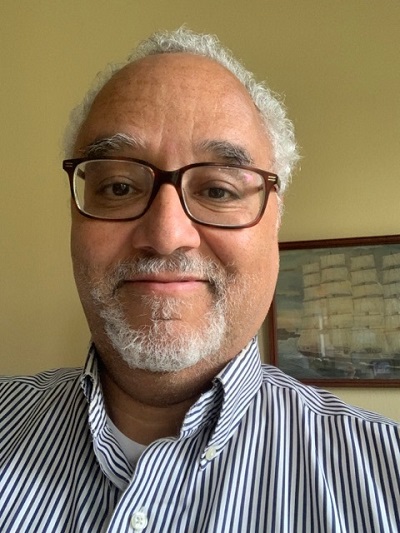 Member Spotlight: David Steigman '75
Member Spotlight: David Steigman '75
This Veteran's Day, we are honored to profile PCW member David Steigman '75, retired Commander in the Naval Reserve and current Membership Chair of the Princeton Club of Washington Council.
I’m a New Yorker, having been born and raised on the Upper West Side of Manhattan. It was a very different neighborhood then, with more economic diversity, although the ethnic diversity remains as strong as ever. I went to a small private high school, my parents feeling the academic and school discipline would be good for me. By the time I began looking at colleges, in the fall of 1970, Princeton had begun broadening its admissions policies, affecting me in several ways. Being a biracial Jew, I represented both racial and religious communities that had not been associated traditionally with Princeton.
I was also pushed towards Princeton by my mother, a school teacher who worked with a woman married to a minister who had graduated from Princeton in the 1930s. My mother and her coworker strongly encouraged me to apply, as did two students from my high school who were undergrads. My visits to campus were very nice and helped cement my decision to go to Princeton.
I enjoyed my four years at Princeton, spent as a history major, a reporter and photographer on the Daily Princeton, and working as a map archivist in the Geology Library Map Room. One of my fondest memories is having a fellowship to study in London during the summer between junior and senior years, for my thesis, Anglo-American Naval Diplomacy 1914-1917.
My scores on the LSAT made me question law school, so I worked for a year in Boston before returning to New York City, living with a Princeton classmate on the Upper West Side and working at a publishing firm.
When I was laid off during the recession of 79-89, I decided to pursue my dream of going to sea. I’d thought about going to sea since I was in grade school. This was probably the result of growing up in New York City with a grandfather who had had a long career as a merchant mariner and a father who fondly remembered his service in the Navy during World War II.
Four years active duty aboard a frigate took me to Beirut, Lebanon in 1982, north of the Arctic Circle in 1984, and many points in between. I made some good life-long friends, met some outstanding leaders, and a few people I won’t speak of. Most people I served with were highly impressed by the Princeton background, although some used it to make the point that, in their view, it was nothing special.
After my four years, I went back to the civilian world but stayed in the Naval Reserve. Since then I’ve been a newspaper reporter, magazine editor, national security consultant, and over the past 15 years worked mostly as a Federal communicator. I’ve been a TSA spokesman, a Department of Homeland Security cyber security communicator, and spent and handled food-borne illness communications at the FDA, including for some major national outbreaks. I currently handle communications for senior executives at the Department of Veterans Affairs.
As a retired Commander in the Naval Reserve, I can look back at significant active duty, writing histories of SEAL and Special Warfare operations, and serving two year-long active duty tours at the Pentagon. In one I handled public affairs and analysis for the Navy’s 2001 Quadrennial Defense Review team, while in the other I provided analytical support to multi-service personnel and training issues.
Now for the advice to undergrads and recent grads. You never know what curveballs life will throw at you. Always be prepared to take advantage of an unexpected opportunity or deal with an unforeseen crisis, whether at work or in your private life. I have handled both of these factors in my own life.
Make use of the Princeton alumni network and the friends you made on campus. I still keep in touch with several friends from the Princetonian and a couple of my roommates. They can be a great sounding board for your ideas and a source of leads for future jobs.
Be open to learning. The work world is much different from when I started; it truly amazes me. The internet, e-mail, personal computers, and all their other offshoots were only a futurist’s dream. Then again, some things are timeless, like an inquisitive mind and good writing skills. Being able to express yourself well in writing will help you more often than you can imagine.
Best of luck – the world awaits.
